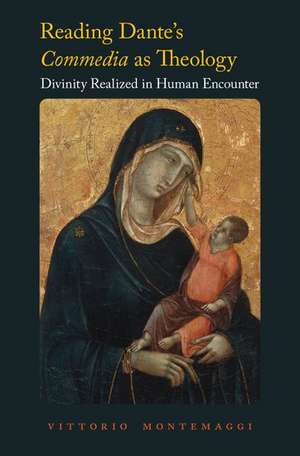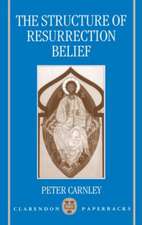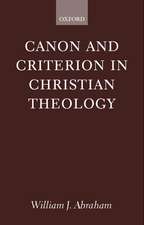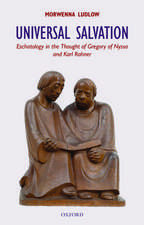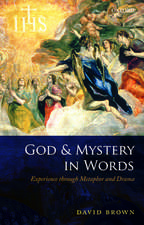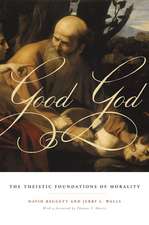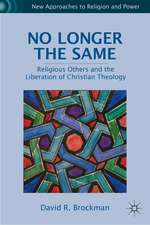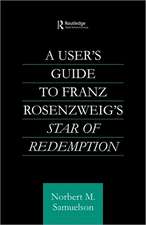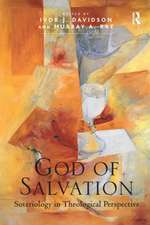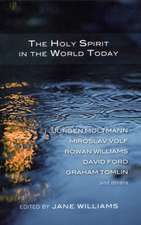Reading Dante's Commedia as Theology: Divinity Realized in Human Encounter
Autor Vittorio Montemaggien Limba Engleză Hardback – 4 aug 2016
Preț: 582.12 lei
Preț vechi: 791.46 lei
-26% Nou
Puncte Express: 873
Preț estimativ în valută:
111.39€ • 116.59$ • 92.71£
111.39€ • 116.59$ • 92.71£
Carte disponibilă
Livrare economică 26 februarie-04 martie
Preluare comenzi: 021 569.72.76
Specificații
ISBN-13: 9780190495466
ISBN-10: 0190495464
Pagini: 328
Dimensiuni: 236 x 155 x 31 mm
Greutate: 0.59 kg
Editura: Oxford University Press
Colecția OUP USA
Locul publicării:New York, United States
ISBN-10: 0190495464
Pagini: 328
Dimensiuni: 236 x 155 x 31 mm
Greutate: 0.59 kg
Editura: Oxford University Press
Colecția OUP USA
Locul publicării:New York, United States
Recenzii
Reading Dante's Commedia as Theology: Divinity Realized in Human Encounter represents the result of a more than a decade of reflection on the extent to which Dante's Comedy is a true work of theology.
Like Dante, Montemaggi is a careful scholar who admits vulnerability and expresses gratitude to the scholarly community that has nurtured him. He writes autobiographically, with a remarkably clear memory, and acknowledges many guides, from Rowan Williams and Denys Turner to his undergraduate students at Notre Dame. Each is named, and together they compose a kind of scholarly communion of saints who have blazed for him a scholarly and spiritual path. Thus, Montemaggi shows usjust as Dante doeshow the life of theologian and disciple are integrally related.
Montemaggi has written a book that invites a new look at what we mean by theological writing in general, as well as theological poetry...All in all, this is a very welcome and deeply original and illuminating book.
Montemaggi has written a truly path-breaking book, one that is a game-changer rather than only a contribution of a few more erudite details concerning some specific cruxes. The book exemplifies and explores, in a pioneering spirit, a different way of doing literary criticism and of pursuing study in the humanities. The change, nevertheless, for all its momentousness, is effected by only a nuance of difference. Actually, this new approach is easily within the reach of all. It is, I believe, what most all of us in critical humanities studies have been aiming at all along, without fully realizing how or why, and without understanding ourselves as fully authorized to do so.
This book provides the most daring reading of Dante as a theologian so far. Montemaggi shows how poetic idiom is integral to a certain novel act of theological representation. The poem's mode of fictional tour of ultimate reality performs the integrity despite the contingency of that reality, and especially of the created and yet self-shaped persons within it. Against more world-refusing readings of Dante's metaphysics, this book shows how this very contingency is paradoxically the best clue as to the non-contingency of the heavenly realm, and the divine in its nature as unlimited love.
Reading Dante's Commedia as Theology is a remarkable achievement, one which is distinctive for both its interdisciplinary charge and its powerful close reading of Dante's Commedia. Bringing into close dialogue the fields of Dante studies, religion and literature, and theology, Montemaggi eloquently demonstrates how Dante's great poem might and can be read as theology. In so doing, he provides richly focused analyses of questions related to love, justice, truth, prayer, and salvation, and explores how the 'dynamics of human interaction' permeate the poem and define the nature of divinity as it is realized in human encounter.
As curious, quirky, and all-embracing as the Commedia itself, Montemaggi's kaleidoscopic book fuses two very distinct modes of writing about Dante that until now have always remained separate: a reader's deeply personal, spiritual engagement with the poem on one hand, and a professional Dante scholar's rigorous intellectual analysis on the other. Presenting Dante not simply as a poet who creates art that happens to involve theology, but as a truly original theologian whose poetic art is his theology, Montemaggi ably articulates the startling inventiveness of Dante's bold theological vision: for the Commedia insists that we are all called to divinization, to union with the living God, whom Dante invites us to discover within ourselves and, more importantly, in our loving relationships with each other.
Like Dante, Montemaggi is a careful scholar who admits vulnerability and expresses gratitude to the scholarly community that has nurtured him. He writes autobiographically, with a remarkably clear memory, and acknowledges many guides, from Rowan Williams and Denys Turner to his undergraduate students at Notre Dame. Each is named, and together they compose a kind of scholarly communion of saints who have blazed for him a scholarly and spiritual path. Thus, Montemaggi shows usjust as Dante doeshow the life of theologian and disciple are integrally related.
Montemaggi has written a book that invites a new look at what we mean by theological writing in general, as well as theological poetry...All in all, this is a very welcome and deeply original and illuminating book.
Montemaggi has written a truly path-breaking book, one that is a game-changer rather than only a contribution of a few more erudite details concerning some specific cruxes. The book exemplifies and explores, in a pioneering spirit, a different way of doing literary criticism and of pursuing study in the humanities. The change, nevertheless, for all its momentousness, is effected by only a nuance of difference. Actually, this new approach is easily within the reach of all. It is, I believe, what most all of us in critical humanities studies have been aiming at all along, without fully realizing how or why, and without understanding ourselves as fully authorized to do so.
This book provides the most daring reading of Dante as a theologian so far. Montemaggi shows how poetic idiom is integral to a certain novel act of theological representation. The poem's mode of fictional tour of ultimate reality performs the integrity despite the contingency of that reality, and especially of the created and yet self-shaped persons within it. Against more world-refusing readings of Dante's metaphysics, this book shows how this very contingency is paradoxically the best clue as to the non-contingency of the heavenly realm, and the divine in its nature as unlimited love.
Reading Dante's Commedia as Theology is a remarkable achievement, one which is distinctive for both its interdisciplinary charge and its powerful close reading of Dante's Commedia. Bringing into close dialogue the fields of Dante studies, religion and literature, and theology, Montemaggi eloquently demonstrates how Dante's great poem might and can be read as theology. In so doing, he provides richly focused analyses of questions related to love, justice, truth, prayer, and salvation, and explores how the 'dynamics of human interaction' permeate the poem and define the nature of divinity as it is realized in human encounter.
As curious, quirky, and all-embracing as the Commedia itself, Montemaggi's kaleidoscopic book fuses two very distinct modes of writing about Dante that until now have always remained separate: a reader's deeply personal, spiritual engagement with the poem on one hand, and a professional Dante scholar's rigorous intellectual analysis on the other. Presenting Dante not simply as a poet who creates art that happens to involve theology, but as a truly original theologian whose poetic art is his theology, Montemaggi ably articulates the startling inventiveness of Dante's bold theological vision: for the Commedia insists that we are all called to divinization, to union with the living God, whom Dante invites us to discover within ourselves and, more importantly, in our loving relationships with each other.
Notă biografică
Vittorio Montemaggi is Assistant Professor of Religion and Literature in the Department of Romance Languages and Literatures at the University of Notre Dame, where he is also Concurrent Assistant Professor in the Department of Theology. Following degrees in Theology and in European Literature, his work has centered on the relationship between language, truth, and love.
